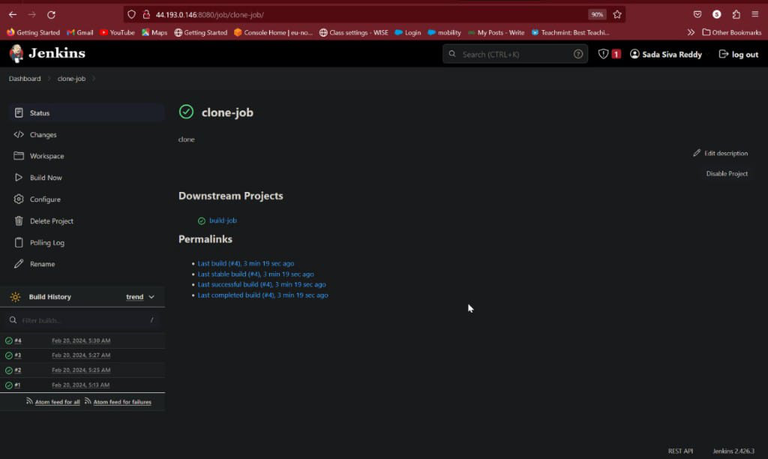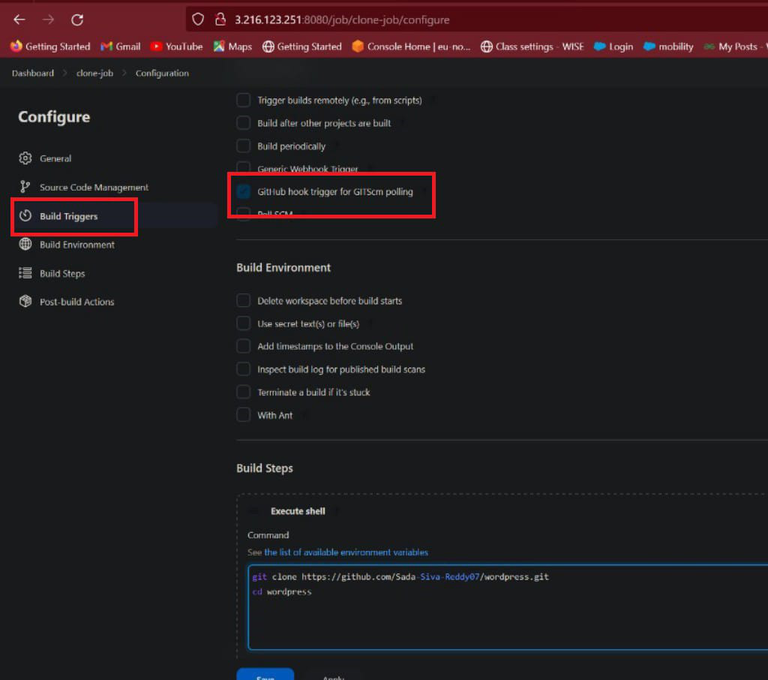Jenkins, an open-source automation server, engages teams to automate different tasks, from building and testing to deploying software. One crucial part of Jenkins is its capacity to plan occupations, empowering the execution of mechanized processes at specified intervals of time. This guide gives insights into the significance of scheduling jobs inside Jenkins, permitting users to smooth out dull errands, improve efficiency, and layout ceaseless incorporation and delivery practices.
Scheduling jobs in Jenkins includes defining when explicit automation undertakings should run, whether it’s every day builds, daily deployments, or other customized schedules. Through the configuration of build triggers and the utilization of cron articulations, users can fit work timetables to accommodate their advancement needs. This guide expects to demystify the interaction, enabling clients to harness the maximum capacity of Jenkins for proficient and automated software development.
Jenkins and CI/CD
Jenkins and CI/CD simply appear to be legit together. You can advise Jenkins to search for changes to a branch in Git, and you can likewise request that it search for changes in any branch, including new ones. On the other hand, if you’re utilizing an alternate source control methodology, you can set up your Jenkins responsibilities to search for new tags.
Thus, paying little heed to how your group deals with their code, Jenkins can incorporate and assemble changes for you. It might take your code and play out the subsequent stage—sending—for your purposes, as well.
Jenkins and Scheduling
However, you may not be searching for CI/CD. Rather than running a job based on an event, you might need to run it at specific times.
For example, on the off chance that an application construct needs a lot of system resources, you may just need to run it short-term so your build systems are free for your development teams during the day. On the other hand, perhaps the inverse is valid for you: saving minor build jobs for nighttime with the goal that your build systems are free for additional basic positions during business hours.
How to Schedule a Jenkins Job
Jenkins Job Schedule Syntax
To begin with, we should take a gander at the Jenkins job scheduling configuration. It seems to be Linux’s cron syntax, however you don’t need to be know all about command line Linux to sort it out.
A scheduling entry comprises of five whitespace-separated fields. You can schedule a job for more than one time by adding more than one entry.
|
MINUTE
|
HOUR
|
DAY
|
MONTH
|
DAY OF THE WEEK
|
MINUTE (0-59), HOUR (0-23), DAY (1-31), MONTH (1-12), DAY OF THE WEEK (0-6)
Each field can contain an specific values and also a set of special expressions
The asterisk * indicates valid values. So, a job that runs every day
In below table they are some special predefined values which can be used to substitute the expressions in jenkins cron.
|
Macro
|
Equivalent
|
Description
|
|
@hourly
|
H * * * *
|
Run at time during the hour
|
|
@daily
|
H H * * *
|
Run at time during the day
|
|
@weekly
|
H H * * H
|
Run at time during the week
|
|
@montly
|
H H H * *
|
Run at time during the month
|
|
@midnight
|
H H(0-2) * * *
|
Run between 12:00 am to 2:59 am
|
|
@annually
|
H H H H *
|
Run at time during the year
|
|
@yearly
|
H H H H *
|
Run at any time during the year
|
Step-by-Step Process Scheduling Jobs in Jenkins
Creating a Job by using Build Periodically
Launch EC2 instance with Amazon Linux2 Kernel 5.10(AMI) along with port numbers set SSH – 22, HTTP 80 and custom tcp is 8080 and select storage t3.micro. Here we are providing port 8080 for jenkins because jenkins run on port 8080
Now connect with git bash terminal by using SSH Client
Now browse official website of jenkins and copy the commands install jenkins packages by using following commands
sudo wget -O /etc/yum.repos.d/jenkins.repo \https://pkg.jenkins.io/redhat-stable/jenkins.repo
sudo rpm --import https://pkg.jenkins.io/redhat-stable/jenkins.io-2023.key
After completion of jenkins packages now we need to install Java because jenkins runtime is java. Install by using following commands,
sudo yum -y install java-17*
Now install jenkins by using following command, here sudo means superuser permission without this permission we cannot install jenkins
sudo yum -y install jenkins
After completion of jenkins installation, now start and enable the jenkins and also check status of the jenkins it was running or not by using following commands
sudo systemctl start Jenkins
sudo systemctl enable Jenkins
sudo systemctl status Jenkins
Now copy Public IP of your instance and Browse it along with Port 8080, because jenkins runs on port 8080
example;
123.34.54.78:8080, like this we have to browse in browser.

Now Jenkins page was open but is ask administration password, this administration password was enable when we check the status of the jenkins. It shown in below figure, copy and paste your administration password and fill all necessary details. Remember username and password.

administration password
This is the official page of jenkins

Official page of jenkins
Now click on New Item

Here give project name and select freestyle project and click on and move to next step

In the job configuration page, let’s scroll down straight to the Build Triggers section. Since we intend to create a straightforward job, let’s select the checkbox marked Build periodically. As soon as we select this checkbox, a Text Box is displayed with the Schedule label.
We have to provide value in a Cron-compliant format.
After that go to build triggers in build triggers there is an option build periodically in that give as you like time, here i am giving * * * * * to run the job every minute
* * * * *
* (Minutes): The job runs every minute.
* (Hours): The job runs every hour.
* (Days of the Month): The job runs every day of the month.
* (Months): The job runs every month.
* (Days of the Week): The job runs every day of the week.
So, the expression * * * * * effectively means “run the job every minute.”
Since we’ve configured the job to run every minutes, we should see multiple build numbers when we go back to the job dashboard after waiting for some time.

Build Periodically
In build steps there is an option execute shell in that give following commands

Build Step
Now create another job for build purpose, here we are creating two jobs one is for clone job and build job and also setup for CI/CD pipeline view

Build Job
In build triggers select build after other projects this option for pipeline and in build steps follow below commands
Now clone job and build job was completed, we setup a * * * * * run the job every minute, so it build automatically per every minute.

Clone-job and Build-job was successful
Same output we can see in pipeline view it shown in below figure

Pipeline View
Creating a Job by using Polls SCM
“Poll SCM” in Jenkins refers to a mechanism by which Jenkins periodically checks a version control system (VCS) repository for changes. It is a way to automate the triggering of builds based on the detection of new commits or modifications in the source code repository.
- Let’s move one step forward and create a job that pulls source code from SCM repository such as GitHub and performs a build.
- Let’s create a new job as explained in the previous section, with a few modifications.
- In the Build Triggers section, instead of selecting Build Periodically, let’s select Poll SCM. As soon as we do that, we should see a text box with Label Schedule.
- Let’s type * * * * * in this box, which means we want to schedule the job to run every minutes:

PollScm method

Here we see that our job build status
Creating a Job by using Webhooks Method
Webhooks in Jenkins plays an essential role in automating the triggering off of builds or different activities in view of occasions that happen in outer systems, regularly version control systems (VCS) like Git or code archive stages. Dissimilar to polling, where Jenkins effectively checks for changes at customary spans, webhooks enable a push-based approach. Here is an outline of webhooks in Jenkins:
Definition:
Webhooks are HTTP callbacks or notifications sent from one system to another when a particular event happens. With regards to Jenkins, these events are many times connected with changes in version control repositories.
- Let’s move one step forward and create a job that pulls source code from SCM repository such as GitHub and performs a build.
- Let’s create a new job as explained in the previous section, with a few modifications.
- In the Build Triggers section, select Github hook trigger for GITScm polling.

Webhook method
- When we made changes in GitHub repository then automatically it triggers then our job was build in jenkins. For more details about webhook method refer this
Conclusion
Planning position in Jenkins is a crucial part of upgrading programming improvement work processes and accomplishing proficient automation. Through this aide, clients have acquired bits of knowledge into the method involved with arranging position plans, understanding build triggers, and utilizing cron articulations to mechanize dreary errands.
By mastering job scheduling for Jenkins, groups can guarantee opportune execution of fundamental errands like building, testing, and deploying code. This ability is major for accomplishing nonstop coordination and constant conveyance (CI/CD), upgrading joint effort, and speeding up the product improvement lifecycle.
Schedule jobs in Jenkins – FAQ’s
Can i use a simple schedule time without a cron articulation?
Yes, Jenkins gives choices to simple schedule like “Build Periodically” without requiring an itemized cron articulation. You can indicate intervals like “Every day” or “Every hour.”
How would I troubleshoot if my scheduled job isn’t running?
Check the Jenkins logs for any error messages. Ensure that the cron articulation is accurately arranged, and the Jenkins server is running.
Could I schedule jobs in view of code commits?
Yes, Jenkins upholds SCM triggers, allowing tasks to be set off naturally founded on code carries out.
Could I at any point plan numerous jobs with various schedules?
Yes, you can design different cron articulations for various responsibilities to make an assorted timetable.
Is it possible to plan jobs with pipeline scripts?
Indeed, Jenkins pipelines support planning utilizing the cron linguistic structure inside the pipeline script.
Share your thoughts in the comments
Please Login to comment...